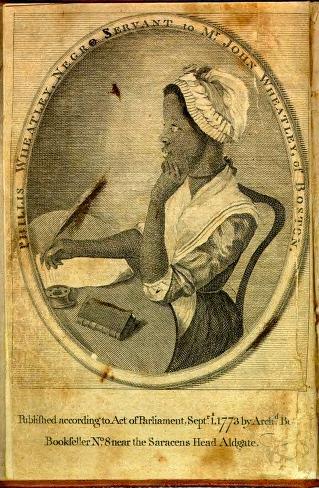|

(c) Pocumtuck Valley Memorial Association, Deerfield MA. All rights reserved.
African Americans : Slavery in New England
|
|
African Americans faced enormous obstacles as they strove to achieve and sustain cultural autonomy under slavery. This struggle proved especially difficult in rural New England where the population density of African Americans was much lower than the concentrations of blacks living in northern cities and on large plantations in the South. House servants isolated in white households found it particularly difficult to retain their African culture and identity.
The early childhood experience of Phillis Wheatley (1746-1784) was similar to that of other young African slaves brought to New England. Slavers kidnapped her in 1753 from the Senegal-Gambia region of Africa when she was seven years old. John and Susannah Wheatley of Boston purchased her and named her Phillis. Phillis Wheatley's later experiences, however, proved far less typical. Within sixteen months of living with the Wheatleys, she had learned English and could read even the most difficult passages of the Bible. The Wheatleys took pride in her intellectual gifts, schooling her alongside their own children and freeing her in 1773. Phillis' education in literature and the classics surpassed that of most women of the period. Moreover, she gained a reputation as a gifted poet in her own right.
Testimonials from leading ministers and public officials of Boston assured a skeptical public that Wheatley had actually written her poems. Lack of interest among Boston publishers led the Wheatley family to bring Phillis to London in 1773 to give her manuscript to a London publisher. The resulting book of "Poems on Various Subjects" reflected Phillis' classical education and Protestant upbringing.
top of page
|
Frontispiece: Phillis Wheatley from "Poems on various subjects"
| author Phillis Wheatley (1753-1784) |
| date 1773 |
| location London, England |
| process/materials printed paper, ink |
| item type Books/Book |
| accession # #L98.054.frex |
|





